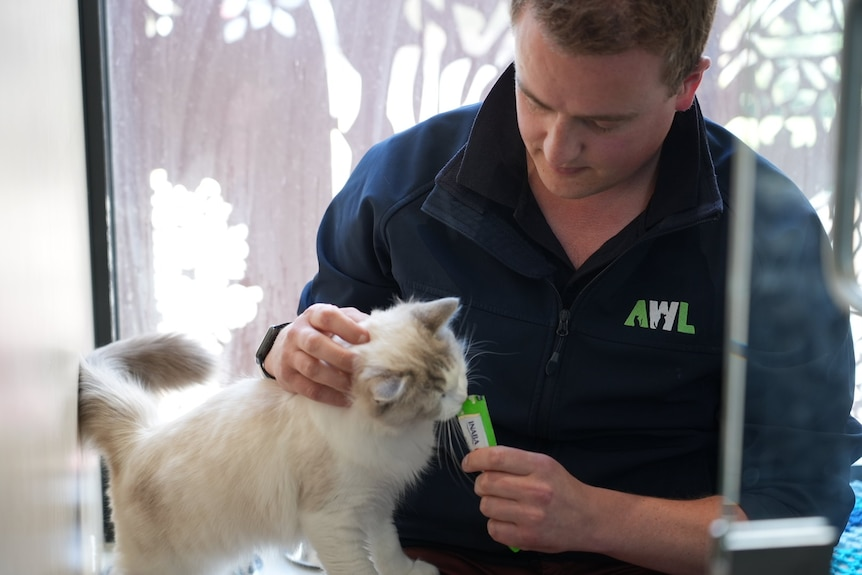South Australia's rental reforms give tenants right to own pets and bans 'no cause' eviction
Chelsea Crosby was forced to leave her cats in someone else's care after rent rises left her homeless and moving from place to place with only two suitcases.
Before experiencing homelessness, the Adelaide woman said she had moved four times in 18 months.
"In that span of 12 months of homelessness, there was a lot of moving around. I didn't know where I was going to be sleeping that night," she said.
"To sum it up in one word was just panic, panicking all the time.
"I would reach out in the middle of the night for a cat that wasn't there, it sounds kind of pathetic but I'd cry myself to sleep over missing these cats."
The 23-year-old has since found temporary relief in community housing and been reunited with her pets, but feared she would have to give them up when her nine-month lease is up.
Yesterday's passing of one of South Australia's biggest rental reforms since 1995 has brought a smile to Ms Crosby's face.
Consumer and Business Affairs Minister Andrea Michaels said the reforms have "struck the right balance" between landlords and tenants amid low vacancy rates in the state.
"We know that more people are renting now than ever before ... we're doing what we can in policy settings to encourage longer term tenancies for people to have that safety net," she said.

Andrea Michaels says the reforms will give tenants more protection.(ABC News: Lincoln Rothall)
What are the changes?
The SA government said the amended legislation, passed in parliament on Wednesday, will give renters more security on their tenancies while protecting the rights of landlords.
Under the reforms, landlords will only be able to end or not renew a lease if the renter breaches the contract, or if a landlord wishes to sell, renovate or move into the property.
For the first time in SA, tenants are allowed to keep their pets under reasonable conditions set by their landlords, which could be keeping an animal outside or cleaning carpets at the end of tenancy.
The notice period to end a tenancy has also been extended from 28 days to 60 days, so renters have more time to move to a new place and make arrangements.
The laws also require landlords to comply with minimum housing standards on their rental properties.
Tenants' information will have stronger protection while victims of domestic violence will receive additional support under the reforms.

Cain Cooke said he is happy to support tenants having pets in rental properties where appropriate.(ABC News: Rory McClaren)
Are both sides happy about the changes?
Real Estate Institute of SA independent chair Cain Cooke lauded the changes, describing it as "one of the best bills around the nation".
"I think there's enough provisions in there that we can be sensible in what pets go into what properties and how they're managed," Mr Cooke said.
“There is no evidence to suggest that this is going to see a mass exodus of landlords, obviously there will certainly be some who are unhappy but we think that’s in the minority."

Nick Fahey got his dog Hugo about two years ago. (ABC News: Rory McClaren)
Pet owner and renter Nick Fahey is pleased that the legislation would help safeguard his tenancy.
He said his landlord initially allowed pets but later changed their minds after the family got their chihuahua Hugo.
The matter eventually resolved in a tribunal which recently ruled in favour of Mr Fahey.
"We wouldn't have got Hugo in the first place if they gave us a hard no because we're so terrified of going back out into the rental market," Mr Fahey said.
Are the reforms enough?
Anthony Cochrane, communications manager at Animal Welfare League, welcomed the changes, but said any "wiggle room" for landlords to "exploit" reasonable conditions also needed to be looked at.
"We'd really like to see tenants be able to have their pets indoors where they belong, we don't think that's reasonable," Mr Cochrane said.
"We'd also like to see the government take steps to reduce the number of landlords that will say no to a tenant based on the fact they already have a pet."
Anthony Cochrane says more than 40 people in the past three months had sought help from Animal Welfare League to rehome their pets.(ABC News: Jessica Warriner)
Mr Cochrane said the organisation had seen a marked increase in people surrendering their pets who were unable to find pet-friendly rentals.
"I went through our waitlist for surrender requests this morning, and just under half of them are due to the rental crisis," he said.
Mr Cooke said the amended legislation helps but more housing supply is also needed.
"We are seeing huge volumes of applications continuing to flow through for available property, lots and lots of demand and we need to free up more housing," he said.
What's missing from the reforms?
Some advocacy groups in the country, as well as SA Greens, have called for rent controls to prevent rent hikes.
The minister has ruled out rent capping or rent freezing in this term of government.
"Across the country I think we're fairly consistent in not pursuing rent capping or rent freezing," Ms Michaels said.
But Chelsea Crosby, who said rent is 60 per cent of her income, said private rentals are becoming out of reach.
"Landlords are kind of in this position at the moment where they can charge what they want for a rental because they're in such high demand," Ms Crosby said.
"Rental bidding was my biggest issue … if I offered $20 more a week then I won't be able to eat."
The SA government banned rental bidding, which prevents landlords or agents from soliciting higher offers, from September this year.








